- Home
- Susan Hill
Betrayal of Trust Page 26
Betrayal of Trust Read online
Page 26
‘You know what I mean.’
‘Oh, I do. Motive. Dad’s motives are as unfathomable as yours. I told you – it’s coming out.’
He wondered whether that was true. Was he turning into his father? He was like Meriel. He had always been like Meriel. He had felt alien to his father every day of his life. It was not possible that he was now becoming like him.
‘Why would he tell Judith about Martha?’
‘What about her? There’s nothing to tell. Judith knew all about Martha long ago, way before they were married. Probably before they had anything to do with one another, before Mother died. Everyone knew about Martha. That she was … handicapped. That she …’
‘Well, yes, obviously, but I didn’t mean in general, did I?’
‘I don’t know what you meant.’
‘Of course you do!’
He might have wondered at that moment, might have hesitated to ask himself, but the thought was barely there, if anyone had asked him he would have denied that he had any doubt at all. Of course she knew. She had probably been the first to know. She was a doctor, like their parents, she above all people would have known. He was the only one who had been kept out of the loop for so long. The moment when he might have stopped himself from saying it flared up and was gone.
‘He told Judith about Mother giving her the injection.’
Cat’s face registered something – some subliminal awareness, some shock, some fear, her eyes were on him, asking, asking.
She cleared her throat. ‘Mother …’
‘Yes. Giving her the injection that killed her. Come on, what other injection would I be talking about? Can’t remember the name but you know …’
‘Si …’
‘Potassium. Don’t know why I forgot, because oddly enough there was a case last month, in the Midlands somewhere, only this was a nurse – you’ve must have read about it. She saw off about half a dozen that way, but no reason or excuse with her of course, it wasn’t –’
He stopped. Cat’s face was grey. She had not taken her eyes off him all the time he had been talking.
Silence. This kitchen has never known such silences, he thought. Never known such vast terrible distances between people who are close. Were close. Need to be.
‘Jesus,’ he said. ‘Jesus Christ, Cat. You didn’t know.’
Thirty-seven
HE SWITCHED OFF the electric razor.
‘Serrailler.’
It was ten past seven.
‘This … It’s … Stephen Foster.’
‘Right.’
‘I need to see you.’
Don’t make it easy. Give him a hard time. This morning, Simon would have given anyone a hard time.
‘I’ll be there in half an hour.’
‘No … I don’t want that. I want to meet you somewhere.’
‘Sorry. Your house or nowhere.’
‘I can even come – come into the police station.’
‘No need. Half an hour.’ He rang off and went on shaving.
He had driven away from the farmhouse just after midnight. Cat was shaken and angry, partly out of professional pride, he thought, that she, doctor among doctors, should be the last to know what had happened, but mainly out of the inevitable distress at what their mother had done. Mercy killing.
At ten to eight, he was at the Fosters’ front door. Foster answered it, barefoot as before.
‘Is your wife in?’
‘No.’
They went into the orange and brown room.
‘Right,’ Simon said, ‘this time, you tell me.’
‘Can I get you a cup of tea?’
‘No thanks. Talk.’
Foster walked up and down the small room a few times, stopped by the window, stopped by the chair on which Serrailler was sitting, notebook out. He rarely wrote anything other than a name or a date but the open page itself often focused the mind of someone reluctant to talk.
‘Listen, this doesn’t go any further.’
‘Depends what you’re going to tell me. You must know you can’t ask for any sort of immunity once you start making confessions.’
‘Who said anything about a confession?’
‘Didn’t you?’
‘Not … right. If you think I rang you because I killed that girl and thought better of denying it, you can forget it. I wasn’t near enough to lay a hand on her. I was on the other side of the road.’
‘Why?’
‘I’m coming to why. I said I wasn’t anywhere near, that I was at the print works because … I shouldn’t have been in Parkside Drive … anywhere near Parkside Drive.’
‘So why were you?’
Foster stopped by the window again and turned his back to Simon. ‘I … I was going to see someone.’
‘Who?’
‘A friend.’
‘A friend.’
‘Someone … my wife doesn’t … didn’t know about.’
‘I need her name.’
‘I don’t want to give you that. I don’t want her involved.’
‘Where did she live?’
‘I don’t want –’
‘Name. Address. Don’t mess me about.’
Foster sighed. ‘Elaine Morner. 8 Parkside Drive – it’s a block of terraced houses pretty much opposite the bus stop.’
‘How long had you been seeing Mrs Morner? Mrs?’
‘She’s divorced. But Mrs, yes. Then? Only a few months. Not quite a year.’
‘How often?’
‘Quite often. Afternoons … evenings. When I could.’
‘So you didn’t want to admit you’d been in Parkside Drive because you were having an affair with Mrs Morner? Understandable. But you could have told us that. We’re not in the business of divulging private information which isn’t relevant to any inquiries, and it probably wouldn’t have been, would it?’
‘I don’t know.’
‘No. If you’re telling me the truth, why you were in Parkside Drive, when you happened to see Harriet Lowther at the bus stop is irrelevant. The fact is that you saw her. You almost gave us some vital information, but you decided not to, and to remain anonymous and not to call us back. Why was that?’
‘Obviously … I was afraid of it getting out. In spite of what you just said. These things do.’
‘And did it?’
‘No. I don’t think so.’
‘So, tell me what you saw. Never mind about your affair, I’m not interested. Tell me exactly what you saw. You refreshed your mind when you watched the television reconstruction, didn’t you, it’s all come back to you. I need to know.’
Foster sat down and leaned forward, hands on his knees.
‘I came out of Elaine’s house. It was just after four – ten past, maybe a minute or so before.’
‘Yes. Harriet was waiting for the four fifteen bus.’
‘Right. I walked to my car – I always parked it away from Elaine’s house, at the end of the block. I happened to look across the road and saw the girl … she was standing on her own at the bus stop. I’m sure she was on her own.’
‘Sure it was her?’
‘As soon as I read her description in the paper, yes. She had blonde hair in a ponytail, she was carrying a tennis racket. About fourteen or fifteen – she was fifteen, wasn’t she?’
‘Yes.’
‘I just thought – this will sound odd – but the sight of her – well, it just somehow cheered me up … gave me a kick, you know what I mean? I don’t go for girls or anything like that, wouldn’t dream of it, but … she was so … bright-looking … sunny-looking … her hair, her expression … holding the tennis racket … she just looked young and full of life, full of … well, sounds daft, but, full of sunshine, somehow. I remembered thinking that. When I read about her. I remembered it straight away. It seemed so – awful. Shocking. Her looking like that and then … just … gone.’
‘Then what happened?’
‘Well, I saw the bus come almost as soon as I saw her – it must
have been travelling down the road – and next thing, I saw it pull into the stop. I unlocked my car but while it had been parked there the sun had moved round and it was too hot to get inside … I opened the doors and waited for a minute, so that’s when I was just looking across, without even realising I was doing it, I suppose … and I saw the bus pull in, then after a minute, it pulled out again. Only she hadn’t got on it.’
‘How can you be sure? You weren’t on that side of the road and Harriet could have been sitting on the far side of the bus.’
‘Yes, but she wasn’t, because I saw her walking away from the stop and on down the road.’
‘Which direction was she walking in?’
‘After the bus. Lafferton direction. Just seemed odd at first that she’d been waiting at the bus stop but hadn’t got on it … that she’d started walking.’
‘Odd at first?’
‘Yes. Only then of course she got the lift.’
Simon’s stomach flipped. ‘She got the lift?’
‘Yes. She was … she glanced over her shoulder a couple of times and then a car came up alongside her and stopped and she got in. But then a white van got in between, overtaking, and I turned back to my car. I didn’t see any more.’
‘Can you explain that?’
‘I got into my car – it was a bit cooler – and when I looked again, they’d all gone … ‘
‘They, meaning …?’
‘The girl, the car she got into, one of those Ladas it was, the white van, the bus … you know. All of it.’
Simon let out a slow breath. ‘This is important information. Do you realise that?’
‘I suppose.’
‘You suppose it’s important or you suppose you realise?’
Foster did not answer.
‘After sixteen years, you come up with information that might have saved Harriet Lowther’s life. Think about it, Mr Foster. Just sit there and think hard.’
‘I know. I … listen, the minute I saw that television programme I knew. I suppose I’d pushed it away before … and then years have gone by, you forget.’
‘Harriet’s father hasn’t forgotten.’
‘No. Only … when I saw the TV it was pretty good, quite accurate – surprising that. And then I thought –’
‘Pity you didn’t “think” sixteen years ago.’
‘I know, I know. I’m sorry. I’ve got to live with that.’
‘What happened to the woman you were having the affair with? Elaine – Morner? You didn’t want your wife to find out, presumably.’
‘I still don’t.’
‘Sorry?’
‘I still don’t want my wife to find out. I still see her. We’re still …… Elaine. Nothing’s changed. That’s the thing.’
‘You’re still having an affair with Elaine Morner? You’ve been having an affair with her for sixteen – seventeen years? Is that what you’re telling me?’
‘Yes,’ Foster said. ‘That’s right.’
The doors of the hatch into the kitchen burst open with such a sudden bang that both men leapt up.
‘I heard that. I heard you. I came in and I heard …’
‘Noeline …’
She burst into the room now, her face twisted with anger and pain.
‘I used to wonder, I used to think … there were always things, only I told myself it was rubbish, and then I stopped wondering, I was ashamed I’d even thought you might be having an affair with someone. I was ashamed! I haven’t had that thought for years – and I come into my kitchen and hear you saying … saying it’s been going on since … hear you telling him. I can’t believe what you said. I can’t believe this …’
Noeline Foster put her hands up to her face and began to take ragged, sobbing breaths.
Simon looked at her husband.
Helpless, embarrassed, flushed with guilt.
‘I’ll leave you to sort this,’ Simon said. ‘But I want you at Lafferton Police Station at two o’clock this afternoon.’
‘I can’t –’
‘If you’re as much as ten seconds late, I’ll have someone round to arrest you. Do you understand?’
Foster nodded. His wife had sat down but her face was still covered with both hands.
‘I’ll want a full and frank statement, every detail.’
‘I don’t want Elaine brought into this.’
‘I am not,’ Simon said at the door, ‘interested in your affair. I am not interested in your mistress. I am not interested in how you sort out your marriage. I’m interested in the probable abduction and subsequent murder of Harriet Lowther, about which you are going to make a statement. Two o’clock.’
He did not look back.
Thirty-eight
THE PRESS OFFICER had said that Bevham Gazette reporter Jed Mulligan was new and bright and would have a fresh take on the Lowther case, which was why Serrailler was now sitting in a coffee bar in the Lanes with a double espresso, waiting to meet him.
‘You want him to focus on this new info,’ Marianne had said, ‘though he’ll have to fill in the background. But the point is, he isn’t a jaded old hack who’ll just regurgitate his last dozen pieces before going to a liquid lunch.’
‘I thought liquid lunches were a thing of the past.’
‘Not on the BG they’re not. But this guy is impressive, he’ll be going places. He’s done some great reporting on the drugs ops.’
Simon groaned.
‘Yes, I know your opinion, but he has and it’s woken people up – not the same old, same old.’
‘Which is what drugs ops always are?’
‘Meet him. Give him everything you dare. Mulligan’s your man.’
He spotted him as he came through the door. Leather jacket. Jeans. Hair gelled and spiked. Dark glasses. Local reporter masking as a bit-part actor.
‘Jed?’
‘Hi. Green tea, thanks.’
That figured. The guy probably didn’t do wheat or dairy either.
‘So … you’ve got new stuff. I saw the telly. Interesting.’
Jed Mulligan drank his tea, apparently untroubled by its being scalding hot, set down the glass and took out a small recorder.
‘Shoot,’ he said.
Simon smiled. Yes, he thought. But he’s quick, he’s sharp. He’ll get it right. The nationals will pick up on it because he’ll make sure they do, he’ll be on the phone the minute he’s filed his copy. Ambition shows.
Mulligan got it right, the Press Association picked up his feature-sized article, which came with several photographs, and the nationals ran follow-ups, albeit shorter and without the background details.
He had written the piece cleverly, so that the new information came first and last but was interwoven with older material and background facts so that anyone unfamiliar with the story would get all they needed on the one page. Everything about Harriet and her disappearance, the subsequent investigations and the finding of the skeletons was there. But what Stephen Foster had come up with the previous day was what readers would notice and, with luck, might remember and think about.
Question. ‘What’s the difference between a Lada and a Jehovah’s Witness?’
Answer. ‘You can shut the door on a Jehovah’s Witness.’
So went the old gag and dozens more like it, about the world’s most laughed-at car. But in spite of that, some people actually owned and drove Ladas. One person in particular. It was a Lada in which 15-year-old Harriet Lowther took a lift on the hot, sunny afternoon of Friday 18 August 1995. That was the day on which she disappeared, and was not seen or heard of until her skeleton was found in a shallow grave the day after the recent Lafferton storm.
Until yesterday’s dramatic new development, it was thought that Harriet was last seen waiting for the Lafferton bus on Parkside Drive around four o’clock that afternoon. Several witnesses saw the pretty teenager, fair hair in a ponytail, tennis racket in hand, standing at the stop. But after the recent television reconstruction and calls to the police hotli
ne, it is now known that Harriet did not get on the bus.
Instead, she was seen walking slowly away from the stop after the bus had left. As she walked she glanced over her shoulder a couple of times, until she spotted the car she was looking for. It slowed beside her and stopped, and Harriet got in. Then it drove on.
The car was a blue or possibly green Lada. The model was probably a Lada Samara.
Detective Chief Superintendent Simon Serrailler, of Lafferton Police, who is now heading up the investigation said: ‘This new information from a member of the public gives us an absolutely vital breakthrough in the Lowther case. No one has come forward until now to say that not only did Harriet Lowther categorically not get onto the Lafferton bus she had apparently been waiting for, but that a car picked her up.
‘Unfortunately, our informant did not see the driver of the Lada and cannot give us any description, but it is clear that Harriet was not abducted. She got into this car of her own volition and by the report of her glancing over her shoulder down the road she was obviously expecting its arrival. Perhaps the bus stop had been the arranged meeting place but when the car did not arrive on time, she started to walk slowly on, sure that it would soon pick her up. Was this a prearranged lift into Lafferton? If so, did she arrive there? Or was she expecting to be taken somewhere else?
‘One thing is certain. Lada cars were not that common by 1995. Their heyday, such as it was, had been five or ten years earlier. So anyone who knows of a Lada, a blue or possibly green Lada Samara, which belonged to a neighbour, someone in their family, a friend, may well remember it clearly.’
The DCS continued: ‘I can’t stress strongly enough how significant this new piece of information is. It’s a real breakthrough and I’m very hopeful that we will get more, which will lead us to the person who killed Harriet Lowther and subsequently buried her body.’
Mulligan had also interviewed Sir John Lowther and obtained a couple of emotional quotes, and ended the piece with an appeal to
the people of Lafferton and its surrounding villages who have longed for a resolution to this terrible tragedy, to think, think, think back. If you lived here when teenage Harriet, with all her life ahead of her, vanished, think hard. Did you know anyone or live near anyone or work with anyone who owned a Lada Samara? Did you perhaps see one regularly parked in a street near you? Or in a lock-up garage next to yours? If you did, please call the special hotline. You could be the person with the key to finding Harriet’s killer. Don’t let them get away with it any longer.

 Mrs De Winter
Mrs De Winter A Question of Identity
A Question of Identity The Various Haunts of Men
The Various Haunts of Men The Pure in Heart
The Pure in Heart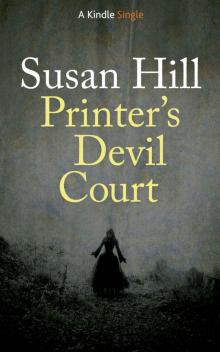 Printer's Devil Court
Printer's Devil Court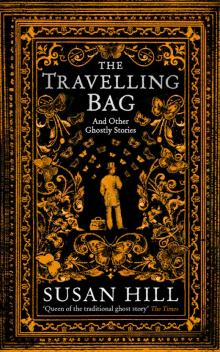 The Travelling Bag
The Travelling Bag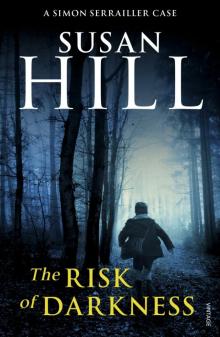 The Risk of Darkness
The Risk of Darkness A Kind Man
A Kind Man Black Sheep
Black Sheep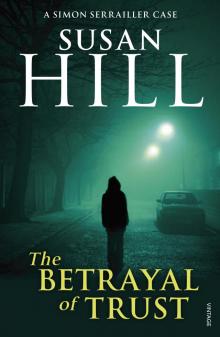 The Betrayal of Trust
The Betrayal of Trust The Service of Clouds
The Service of Clouds Betrayal of Trust
Betrayal of Trust The Small Hand
The Small Hand Dolly
Dolly Jacob's Room Is Full of Books: A Year of Reading
Jacob's Room Is Full of Books: A Year of Reading The Vows of Silence
The Vows of Silence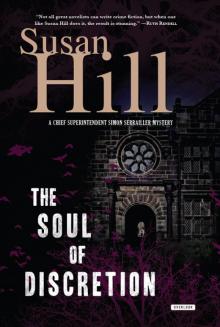 The Soul of Discretion
The Soul of Discretion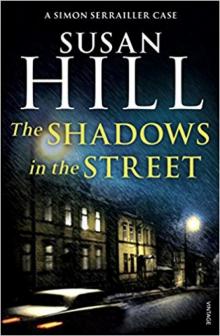 The Shadows in the Street
The Shadows in the Street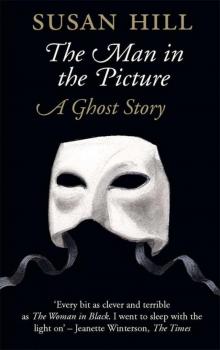 The Man in the Picture
The Man in the Picture Air and Angels
Air and Angels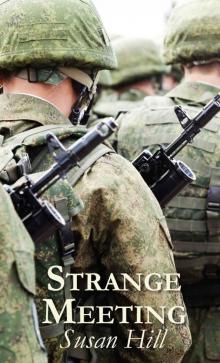 Strange Meeting
Strange Meeting In the Springtime of the Year
In the Springtime of the Year Howards End Is on the Landing: A Year of Reading From Home
Howards End Is on the Landing: A Year of Reading From Home From the Heart
From the Heart Old Haunts
Old Haunts The Mist in the Mirror
The Mist in the Mirror The Woman in Black: A Ghost Story
The Woman in Black: A Ghost Story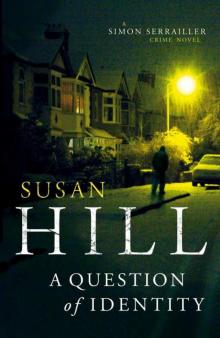 A Question of Identity (Simon Serrailler 7)
A Question of Identity (Simon Serrailler 7) The Comforts of Home
The Comforts of Home Mist in the Mirror
Mist in the Mirror Jacob's Room is Full of Books
Jacob's Room is Full of Books The Woman in Black
The Woman in Black Howards End is on the Landing
Howards End is on the Landing